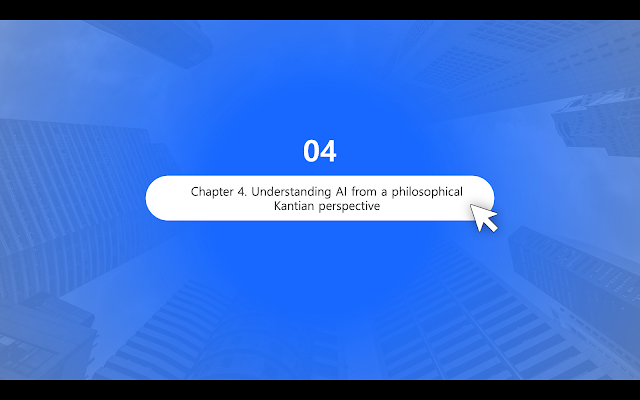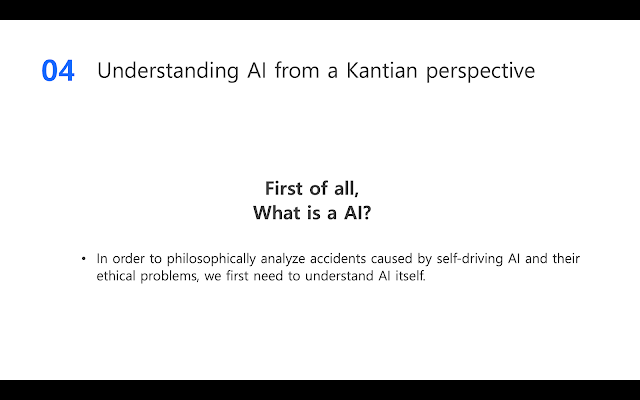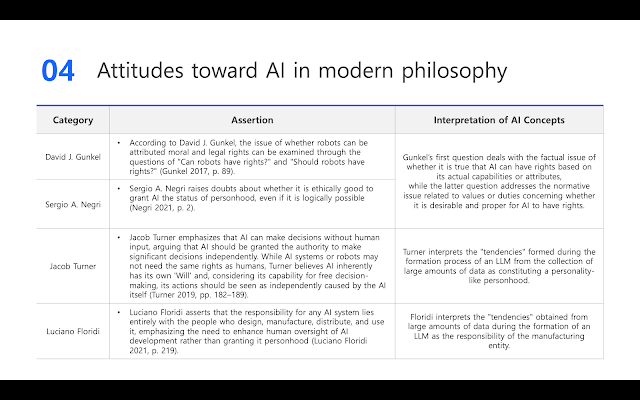Presentation: Understanding AI from a philosophical Kantian perspective
(Transcript) Below is what I researched and presented in my class from 2024.06.07 to 2024.06.11.
This is just a simple 10-minute presentation.
(Presenter: )
Nice to meet you guys, in my persentation, I would like to show up Understanding AI from a philosophical Kantian perspective.
I'm going to divide my presentation into 3 parts, the first of which is "What is a AI?,"
The second part is "Kantian perspective," and the third part is "Attitudes toward AI in modern philosophy," So let's go ahead.
First of all, What is a AI?
In order to philosophically analyze accidents caused by self-driving AI and their ethical problems, we first need to understand AI itself.
Chat GPT works by using a Large Language Model (LLM).
Initially, there is an untrained GPT-3 model with 175 billion parameters consisting of random values.
This model is trained on a large dataset and uses a transformer model. The learning process involves repetitive learning.
++ What’s a Transformer Model?
A transformer model is a neural network that learns context and thus meaning by tracking relationships in sequential data like the words in sentence.
And of course, simple linguistic comprehension isn't enough to make an "AI that can drive itself," so there is another capability needed.
That's where GPTs come in.
Chat GPT-4 is a multimodal system that processes and understands many different types of data.
Chat GPT-4 can recognize images and identify aspects that are out of the ordinary.
++ Multimodal: A system that processes and understands data in multiple forms.
For example, it can recognize an unusual image, such as “a man is ironing his clothes on a ironing board attached to the roof of a moving taxi” and even recognize that it's unusual.
Then, from a Kantian philosopher's perspective, what about personhood in AI?
According to a Kant's book『The Metaphysics of Morals』,
A personal being must have “the capacity to be conscious of its own sameness in the different states of its being” as well as the capacity to “attribute its actions to itself”.
Humans, in particularly, must have a “self-consciousness” that attributes thoughts and experiences encountered at different times to the same entity.
A personal being has the autonomy to act in accordance with a self-established moral concept, and thus he can attributes his actions and the responsibility for it exclusively to itself.
So, According to Kantian interpretation of personhood, which was influential in the formation of the modern concept of personhood, including the concept of autonomy, personhood can only be ascribed to human beings who are capable of rational thought and moral judgment, and not to artificial machines such as artificial intelligence.
Next, let's see, how have been personhood of AI interpreted in modern philosophy.
Let's start with David J. Gunkel. In his 2017 work, Gunkel discusses two fundamental questions: 'Can robots have rights?' and 'Should robots have rights?' He differentiates between the factual aspect—whether AI's abilities enable it to have rights—and the normative aspect, which involves whether it is morally appropriate for AI to hold such rights.
Next, we have Sergio A. Negri, who in 2021 questioned the ethical implications of assigning personhood to AI. Even if it’s logically possible, Negri asks us to consider whether it is morally sound to do.
Moving on to Jacob Turner, who in 2019 emphasized AI’s ability to make decisions independently, without human input. He argues that AI, while not necessarily needing the same rights as humans, inherently possesses its own will and should be seen as capable of independent action.
Lastly, Luciano Floridi argues that all responsibilities for an AI system rest with its human creators—those who design, manufacture, distribute, and use it. His perspective calls for increased human oversight rather than granting AI personhood.
Conclusion :
In conclusion, these thinkers present us with a spectrum of views that challenge us to think about AI not just as a tool, but as a potential entity.
And, from a Kantian perspective, which has been highly influential in modern philosophy, it would be wrong to give AI personhood.
Thus, from a classical Kantian perspective, these perspective argue that judgment should be left entirely to humans at critical moments when important ethical questions arise.
Thank you for listening my part of presentation.
【See also】
[1]【온라인 세미나】ChatGPT 새로운 역사의 시작, Blogspot, <https://decentpark-into-thevencera.blogspot.com/2023/06/chatgpt.html>, June 01, 2023.
[2] What Is a Transformer Model?, NVIDIA Blog, <https://blogs.nvidia.com/blog/what-is-a-transformer-model/>, March 25, 2022 by Rick Merritt.
[3] 進歩のジレンマ: ChatGPTの進歩が人権を尊重するための基準や自由の必要性を検証する。【Brief Article】 , Blogspot, <https://decentpark-into-thevencera.blogspot.com/2023/05/chatgpt.html>, May 25, 2023.
Presentation: Understanding AI from a philosophical Kantian perspective by Jaehyun Park is licensed under CC BY-ND 4.0








Comments
Post a Comment